Gentleman George says farewell
Cochran retires from tournament fishing at 62
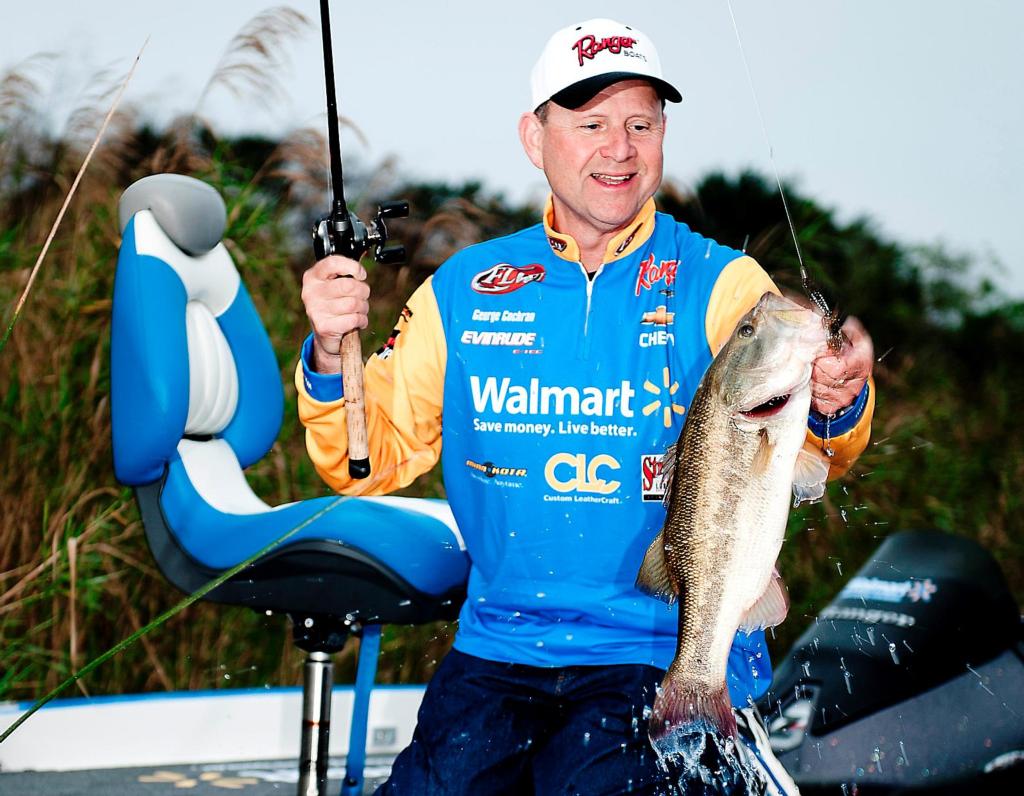
After a 32-year career in professional bass fishing, Walmart pro George Cochran is hanging up his rods and reels to spend more time with his family. One of five anglers to win both the Forrest Wood Cup and the Bassmaster Classic, Cochran will go down as one of the true legends of the sport.
In his final tournament, the FLW Tour Open at Sam Rayburn, Cochran solidly placed 35th – proving at 62 years old he can still compete with the best fishermen in the world. The Hot Springs, Ark., native is known best as a superb shallow-water angler – designing several spinnerbaits and crankbaits for the Strike King Lure Company. In his career, the former railroad brakeman earned over $2 million – his biggest payday being the $500,000 he won at the 2005 Forrest Wood Cup.
While Cochran was fierce on the water, his soft Arkansas accent and genial personality belied his competitive side. After decades of treating fans and the media with openness and respect, the nickname Gentleman George stuck. Below are his final thoughts as he closes the door on his illustrious tournament career and enters a new chapter of life titled retirement.
Q: Why is now the appropriate time to step away?
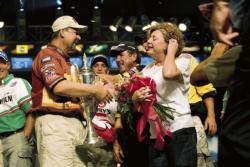 A: Well, it was my goal to retire at age 62. My last goal in fishing was to win the Forrest Wood Cup. Once I did that I completed everything I wanted to and decided 62 was the right time with Social Security and all. Since I’m walking away now, I will still be in good enough health to do some of the other things I enjoy. I still exercise; I go on a lot of walks to stay in good enough shape to play with my grandchildren. I promised my wife when I retired we would go on some trips. We’re heading to Hawaii soon and we’ll go to Switzerland the following year.
A: Well, it was my goal to retire at age 62. My last goal in fishing was to win the Forrest Wood Cup. Once I did that I completed everything I wanted to and decided 62 was the right time with Social Security and all. Since I’m walking away now, I will still be in good enough health to do some of the other things I enjoy. I still exercise; I go on a lot of walks to stay in good enough shape to play with my grandchildren. I promised my wife when I retired we would go on some trips. We’re heading to Hawaii soon and we’ll go to Switzerland the following year.
Q: The accolades are many. What accomplishment are you most proud of?
A: That was winning the Forrest Wood Cup. It happened in front of family and friends, but most importantly, it completed all of my goals. Back when I started fishing in the late 70s and early 80s I learned that the people who were really making a living in fishing were the ones that won the end-of-the-year championships. After I won the Classic in 1987 I decided to quit the railroad and fish full time. I continued to make a living fishing until I retired. The Cup just sewed everything up for me.
Q: What is your biggest regret or disappointment?
A: By golly, I have no disappointment when it comes to fishing for a living. Even when I wasn’t doing that well, I wasn’t working on the railroad. When you’re fishing for a living, you really don’t have anything to gripe about. I’m probably one of very few people who doesn’t let memories bother me. I’ve won a lot of tournaments where I fished perfect. For example, I never lost a bass during the entire Forrest Wood Cup. But yes, there were tournaments where a missed fish here or there cost me a check or a top 10. But looking back on it, those really don’t bother me. I could name a few tournaments that I should have won, but I really believe that they just weren’t meant to be.
Q: How did you get started in bass fishing? What drew you to the sport?
A: When I was 8 years old my father bought a house on a lake. He never fished a day in his 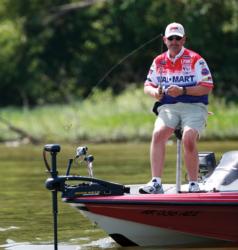 life, but I would walk the bank and just fish and fish and fish. At first I started with a cork and minnows and then I bought some lures. After a while I stopped playing kickball and all that and I finally convinced my parents to help me get a boat. I also had a neighbor, Pete Jawoski, who fished almost every weekend. I kept working him and finally with the help of my mother I started fishing with him at age 11. He’s the one who taught me how to throw topwaters and all that. Then I’d read all the different magazines cover to cover. Back then I never dreamed about doing it for a living – it was just about learning to catch more fish.
life, but I would walk the bank and just fish and fish and fish. At first I started with a cork and minnows and then I bought some lures. After a while I stopped playing kickball and all that and I finally convinced my parents to help me get a boat. I also had a neighbor, Pete Jawoski, who fished almost every weekend. I kept working him and finally with the help of my mother I started fishing with him at age 11. He’s the one who taught me how to throw topwaters and all that. Then I’d read all the different magazines cover to cover. Back then I never dreamed about doing it for a living – it was just about learning to catch more fish.
Q: Those who know you well know you’re incredibly stubborn when it comes to fishing shallow. Why did you never invest the time and effort to become a better offshore angler?
A: That’s a real good question. First of all, I can fish deep and there were times where I fished deep and did well. But I always try and find some areas shallow that hold bass. That’s my strength and I’ve always tried to fish my strengths. I want to catch them the way I think I will do the best. If I’m fishing shallow and catching fishing, I feel like it’s going to be hard for anyone to beat me. That’s being hard-headed, but that’s also made me successful. I have fished deep, but it’s about the very last thing I will try.
Q: You’ve earned quite a few checks en route to over $2 million in career earnings. How many of those checks came from water 10 feet or deeper?
A: I would probably say I’ve cashed 20 or 30 checks from water 10 feet or deeper. At the 2008 FLW Series East-West Fish-Off at Lake Amistad, I caught my fish in anywhere from 40 to 60 feet on a drop-shot. Me and my co-angler partner caught probably 17 pounds a day and that was just the way it was. I can say I’ve never truly won a deep tournament. I did win a BASS Invitational fishing a jerkbait over water 10 to 15 feet deep, but I was only pulling the bait down 3 or 4 feet.
Q: Your good buddy Larry Nixon is almost the complete opposite of you as a fisherman. While you 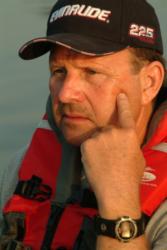 were burning a spinnerbait in the mud, Nixon would be throwing a worm deep. Did you two become such good friends because you never got in each others way?
were burning a spinnerbait in the mud, Nixon would be throwing a worm deep. Did you two become such good friends because you never got in each others way?
A: (Laughs) No, not really. He is my best friend and I married his cousin. We hunt together all fall and winter and we stay together at tournaments. We tell each other everything, but 90 percent of the time we don’t listen to each other when it comes to fishing. In 2010 at Lanier, he told me exactly how he was going to win the tournament. But I was catching them up the river like that Wheeler boy that won this year and I told him, `Larry, I’m not going to fish that way.’ He took third of course and I barely made the top 30. Over the years, I’ve helped him some and he’s helped me a lot. The most amazing thing is that we never got mad at each other, at least when it came to fishing.
Q: What is Nixon going to do on Tour next year without you?
A: He’ll be just fine. I’ll probably miss him more than he’ll miss me. We’re all friends out there, he just happens to be my best friend. What I will miss more than the tournaments is all the fishermen and the FLW crew. Larry and I will reunite for duck hunting and deer hunting in the fall. I think his goal is to fish until he’s 65. Mine was 62. He’s not ready mentally now like I am. I think he still wants to win that Cup – that’s his burning desire.
Q: Which nickname do you prefer – Gentleman George or Mr. Money?
A: (Laughs) That first one is a big compliment; I like that one a lot. The second one is a reference to a Strike King bait that I won a lot of money on and was a top seller at Walmart for a number of years.
Q: The nickname “Mr. Money” also became synonymous with you succeeding at the sport’s richest events. Doesn’t that carry some significance?
A: Like I said earlier, when I started fishing I noticed the only fishermen that were making a 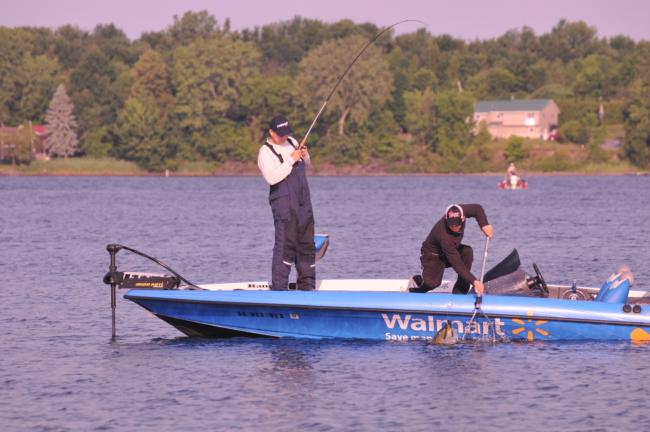 good living were the people winning the championship. Every year I tried to make it to the championship and then I would spend a month mentally and physically getting ready for that tournament. I was always focused on winning those championships – they were the only tournaments I thought about. That’s why I won three and almost won two or three more. But that’s business. Gentlemen George is a real complement because it is about who I am as a person.
good living were the people winning the championship. Every year I tried to make it to the championship and then I would spend a month mentally and physically getting ready for that tournament. I was always focused on winning those championships – they were the only tournaments I thought about. That’s why I won three and almost won two or three more. But that’s business. Gentlemen George is a real complement because it is about who I am as a person.
Q: Between Champlain, Wheeler and Rayburn, you got on a little roll to end the 2012 season. Any chance this is a Jimmy Houston-like retirement where you change your mind next spring?
A: No. I’m not going to change my mind when it comes to tournament fishing. I’ve got several companies I’m still going to do promotional work for like Ranger and Evinrude. But I can feel it in my hands, my thumbs, my arms. When you get old your body tells you, `that’s it.’ I got to be about 55 or 58 and then I had things that started bothering me. I just can’t keep my focus like I did when I was young – that’s the bottom line.
Q: The sport has changed a lot since you fished your first tournament back in 1979. Where do you see it headed in the future?
A: It’s all positive. One trend I see is that the pros seem to be getting younger every year. Despite being young, they are full of information; they’ve put in their time and studied in depth on the Internet. When they go to the lake, it’s not trial and error like it was for us. And the electronics are so much improved. Everything is much faster now – and that’s all good. My son is a striper guide and he doesn’t even drop a line in the water until he sees the right fish on the graph. It’s amazing and it’s a wonderful thing.
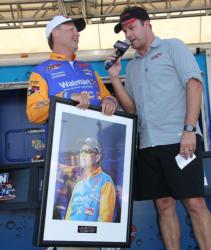
Q: Without the rigors of travel and tournament fishing, what will you do with your newfound free time?
A: You’ve got to realize I’ve been doing this for 30-something-odd years. I will not miss any of the travel I can tell you that. But I will stay busy in the fishing industry – promoting and teaching kids. I really enjoy that aspect of it. I will not miss being gone all the time and pulling those boats all over the United States. I’m really looking forward to turning the page and spending more time with my family and my grandkids and crossing off some things on my bucket list with my wife Debra. I think I will stay plenty busy.
Q: Any final message for the fans?
A: I appreciate all the kind words I’ve received. As a pro fisherman, one of the biggest complements I get is when someone comes up to me and says, `I’ve been watching you fish for 20 years.’ The last couple seasons I’ve had a lot of people come to me and tell me, `I like watching you fish’ or `you fish the way I like to fish.’ To me, that’s the biggest complement a pro fisherman can receive.